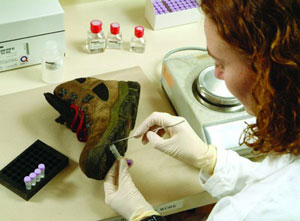Forensic Scientist
Tasks & duties

Forensic scientists may do some or all of the following:
-
visit crime scenes to find evidence
-
take notes and draw sketches of crime scenes
-
analyse physical evidence such as fibres, glass, debris, firearms, bullets and marks made by tools or weapons
-
identify drugs found on people, in body fluids or at crime scenes
-
analyse biological evidence such as hair, blood and other body fluids
-
analyse body tissues for poisons
-
write reports on the results
-
give evidence in court
-
investigate civil court cases such as fire or insurance claims
-
train police staff in collecting evidence
At the technician level, the main tasks are to help scientists prepare and carry out a range of experiments and tests.
Specialisations
Forensic scientists usually specialise in one area of forensic science such as DNA analysis, illicit drugs analysis, firearms examination or toxicology (the analysis of body samples for drugs and poisons).
Skills & knowledge

Forensic scientists need to have:
-
the ability to use science to investigate crime
-
knowledge of the chemical make-up of things such as paint or textiles, blood, body tissues and DNA
-
knowledge of poisons and drugs, firearms and explosives
-
research skills
-
skill in analysing and interpreting research results and other information
-
practical skills for performing experiments and operating scientific equipment
-
problem-solving skills
-
planning and organisational skills
-
communication skills
-
writing skills, for writing reports and for publications
-
maths and computer skills
Entry requirements
To get a technician level job, you need to have a Bachelor of science (BSc) majoring in chemistry, biochemistry, biotechnology, medical laboratory science or molecular biology. However, most employers nowadays prefer a Masters in science (MSc) in any of these areas.
Those who want to do DNA analysis need to have a BSc in molecular biology as a minimum. It is increasingly common for those graduates to then do a postgraduate diploma or Masters in forensic science.
Most successful applicants (about 70%) for permanent positions as forensic scientists have a Masters in forensic science. Some may have a PhD.
Secondary education
A tertiary entrance qualification is required to enter further training. An A or B Bursary, or NCEA equivalent, is preferred. Useful subjects include maths with statistics and/or calculus, biology, chemistry and English.
Training on the job
Many practical forensic science skills are gained on the job. Once a person is employed they are usually trained in the specific scientific techniques that are involved in their job.
Useful Experience
Useful experience includes laboratory work, and research or work in the fields of medicine or chemistry. Previous experience doing casual work for Environmental Science & Research (ESR) might also be helpful.
Check the ESR website for information on summer studentships for university students.
Related courses
Biochemistry and Cell Biology
Forensic Science
Human Biology
For more information, please refer to Career Services.
Document Actions
